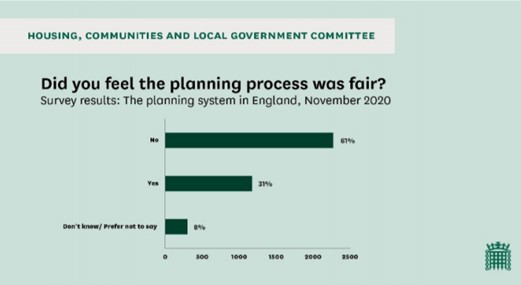The fight for the heart of the Planning Bill

by Vince Wall
Observers are looking at the new planning bill as a way to radically shake up the planning system. The new Planning Bill, which was formally announced in the Queen’s Speech is already proving controversial.
Recently, a cross party group published a report titled “The future of the planning system in England.” The research behind the document involved public consultation, with over 5,000 citizens asked for their opinions on the existing planning system. One survey found that the majority of people felt the planning system was unfair. But another survey question found that over 70% of respondents had, at some point, engaged with a planning application. Overall the report considered the Government’s proposed reforms to the planning system. As well other observations, the report concluded that the Government should reconsider the case for the three areas proposal (zoning), and felt “unpersuaded that the Government’s zoning-based approach will produce a quicker, cheaper, and democratic planning system”.
As well the points emphasised by Ministers, other groups are calling for the bill to deal with specific matters.
A letter sent last week by the UK Green Building Council (UKGBC) and sustainable business body the Aldersgate Group, highlighted the need for the bill to take on climate change. The letter emphasised how planning could help the nation progress towards a net zero target. The letter calls for the forthcoming planning bill to “align directly with the obligations under the Climate Change Act and plans to reverse nature’s decline in the Environment Bill”. The signatories of the letter included developers, construction firms, architects, property consultancies and utility firms, such as Arcadis, BAM Construct UK, British Land, Berkeley Group, Anglian Water, CBRE, JLL and Sir Robert McAlpine.
Aside from those in support of a radical shake up, the bill does have its critics. Resentment continues to grow with backbench Tory MPS, especially those committed to protecting their home county constituencies. Back in October 2020, former Prime Minister, Theresa May MP, criticised the Government’s proposed changes to the planning system as being “ill-conceived” and “mechanistic”, with no guarantee that more homes would be built. Furthermore, many of the more rural and suburban communities across England are bound to be outraged if more of their surrounding countryside is encroached upon. Local campaign groups and the likes of CPRE are already setting their sights on the Bill. The CPRE website states “Under these new proposals, our ability to shape the future of where we live – a right communities have had for 70 years – could be lost with the stroke of a pen”.
Some criticism has been directed at the entire approach. Labour, Shadow Housing Minister Mike Amesbury MP, has stated that councils, rather than central Government, “must be in the driving seat if we are to create decent, safe, affordable housing for all”.
To conclude, it seems Jenrick and Johnson essentially want to push for a bill that will be all things to all men. Jenrick has repeatedly invoked an aspiration to “simplify” the planning system (helping developers) but simplify for who? For under resourced and overworked local authorities tasked with understanding how to balance the demands of a new system? And how will this work when house builders get bogged down in lengthy meetings to discuss new design codes and arguments over the viability and the reasonability of providing a significant bio-diversity net gain?





